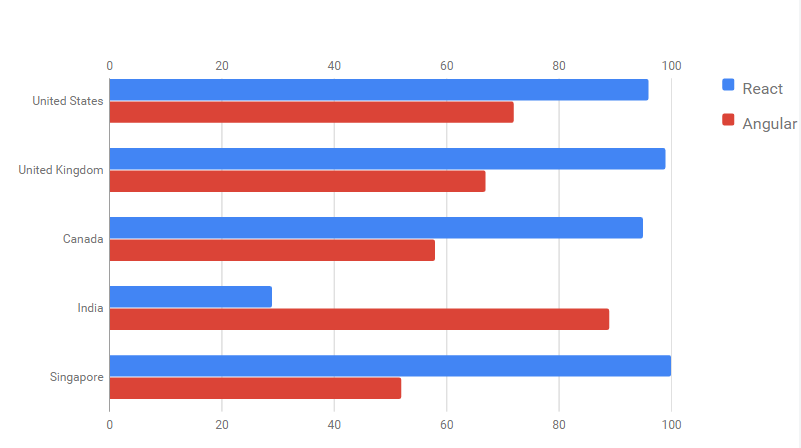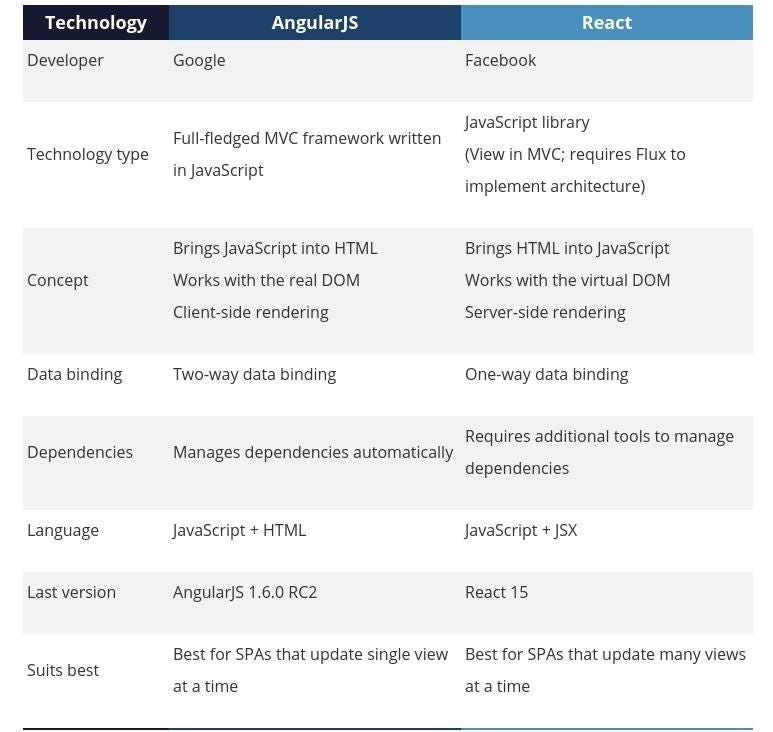Web development is progressing at an incredible speed these days and trends that were hot in 2017, today will be considered nothing less than archaic. Users are having more control and power and companies are shifting their services according to the user needs, which may be unpredictable. In this article, we will cover the most significant and most worthy to mention debates between Angular and React in 2018. So here we go:
First, while Angular and React are both JS libraries, they don’t do the same thing. They are not used for the same purpose (it’s not because it’s JS that it’s used for the same thing), so it’s hard to compare, but:
- Angular is a MVC JS framework, it handles a lot of stuff out of the box. Its most notorious feature was the two-way data binding (dropped with Angular 2).
- React is a JS library that helps you handle views (so, just the V in MVC). Basically, React comes with the concept of component, which has properties. It’s more lightweight, doesn’t handle a lot of things out of the box, but IMO, it handles enough.
- Angular is centered around the concept of application (Angular v1 at least), React is centered around the idea of a component. That’s the main difference for me.
- Some talks about Ember, Meteor, etc., they are another thing, used for another purpose, so it’s hard to compare.
React is light, you build components that (together) make an app. You can reuse those components, put components into other components, etc.. You can easily find components (as npm/yarn packages) for your need. It easier to maintain because (still IMO) you maintain components, not the whole app. It’s easier to test, find bugs, etc. React doesn’t do things by default, it just handles the views (providing components and methods). You can make your app grow without fearing maintainability/performance issues.
The React Team has some other exciting projects: React Native, which makes React a door to code for the web, but also desktop & mobile apps.
The last point is: I have no doubt that Angular will be dropped in the next years.
Enguerran Weiss, D.A. Interactif / Web designer / Integrator Freelancing (2012-present)
A React vs. AngularJS comparison is a favorite topic. React, and AngularJS are both advanced and high-level, broadly adopted JavaScript (JS) technologies that we use to create interactive single-page applications (SPAs). The number of JS tools for fast single-page application development is regularly developing, suggesting the choice of which technology to rely on more challenging for us as web developers.developers.
- International Interest

This Model–View–Controller framework has become extremely popular with web developers. React is even more generally used by JavaScript programmers, although it’s really a library, not a framework: the React library only has a View but lacks Model and Controller components. So how did React became so popular? And how can we reasonably compare a framework AngularJS with a library React?

This is only a small overview of the compare between React and AngularJS. We’ll discuss AngularJS and React
Let’s us talk the basic specification first. This will give you a bright idea of the essential features they both having.
- JavaScript
- CSS3
- HTML5
- Design Patterns and Object Oriented Principles
Compare Between AngularJs vs. ReactJs
Angular is one of the most famous javascript frameworks and like other related software suites it offers multiple out-of-the-box solutions and designs. At a time when, React ecosystem contains any number of composable, targeted online tools and ReactJS acts as one of the building blocks.
Advantages of AngularJs vs. ReactJS
- Easy Decision-Making:
- Since AngularJS is a framework, it gives significantly views and functionality that are out of the box. AngularJS helps you get started more quickly without feeling intimidated by choices. This also helps new developers feel at home more quickly and makes switching developers between teams more comfortable and efficient.
- Component Structure:
- AngularJS 2 developes a framework for a platform. Therefore, you can quickly use its components with other frameworks. Additional functionality may be performed just as in the form of components that achieve it completely, so as directives that extend the functionality of the existing element.
- Developing Environment:
- You can take your favorite environment for developing with AngularJS. Although most of its developers use TypeScript, you are free to apply Javascript, CoffeeScript, or Dart. For templates, you can use both pure HTML or pre-processors like Jade.
- Testing in AngularJS vs. ReactJS:
- Basically, AngularJS exists to make it easy to write tests for applications, mainly if you utilize modules, as suggested in the official documentation. Accordingly, AngularJS has a significant advantage of testing ease which gives an extra reason to choose AngularJS.
As you come to the bottom of the discussion, now a few points are clear to you on both the frameworks. Hence, if you are deciding to choose one of them, then here’s my opinion.
If you are trying to develop a basic web app, then both can be used. Still, ReactJS is SEO friendly, real-time and compatible with heavy traffic. Whereas, AngularJS offers smooth development and testing along with reliability.
Vishal Kushwaha, studied at Ganpat University
React vs. Angular?
I may not be able to pick a clear winner between the two but let me help you make an educated move based on the scenario.
Scenario 1
Use Angular, given you have a group of experienced ( moderately or high ) developers who have a good hold on typescript, they will be able to put Angular to good use. Now, most business enterprise applications will require a generic UI which is strongly supported by the architecture which comes with Angular.
Scenario 2
Use React + Redux. Now React which is purely based on JavaScript allows you to model UI (view) based on state changes. Its functional approach is reasonably simple to any beginner and can be picked up within a week or so. Redux provides the architecture for your application. The performance achieved by both libraries combined is critical for larger applications with custom UI. A good use-case would be social media platforms which have similar needs.Facebook was rebuilt publicly using React in 2013, which saw a massive rise in traffic and was also well supported by the user community. Facebook later used React to build Instagram and Whatsapp which both have a billion users worldwide.
Shiva Prakash, Research Analyst at Edureka
React, and Angular 2 both are great technologies that give different opportunities in development. Angular 2 is really good at declarative solutions, but it lacks the freedom and simplicity of React.
Angular is on the market from 2010 comparing React in 2013, therefore it evident that the first one has a more significant community. Angular recently launched Angular 2 and announced plans for 4th version so we can expect future improvement of the product.
Finally, there is no “silver bullet,” you need to choose the right solution that will suit your challenges, goals, and long-term strategy.
Angular 2 Pros
- Support for web components. Rather than having a closed system for modularising AngularJS applications, Angular 2’s foundations lie on the emerging Web Components standard. What this means is that AngularJS is able to use directly, without any wrapper coding, any component written as a Web Component.
- Usage of Typescript. The biggest selling point of TypeScript is tooling. It provides advanced autocompletion, navigation, and refactoring. Having such tools is almost a requirement for large projects.
- Great performance. Angular2 — doesn’t make broad object comparison. If items are added/removed to/from an array, change detection won’t detect it. The same for object properties as long as they are not directly bound from the view.
- Angular2 CLI. The Angular2 CLI makes it easy to create an application that already works, right out of the box. It already follows our best practices!
Angular 2 Cons
- Difficulty in learning. If you haven’t used typescript before, you’ll need to learn it and spend time on it.
- Regular DOM. Angular manipulates actual DOM directly, which makes it quite slow and un-efficient in comparison with React.
- Difficulties in the server templating Angular 2 still maintain physical separation between the JavaScript driving your application, and the HTML is rendered.
React Pros
- Total separation of data and presentation. React provides little more than a presentation layer. Although React components do have a concept of ‘state,’ this is best used for ephemeral storage.
- Easy to start writing. Writing in React is almost similar to writing in HTML. Therefore you can quickly begin coding, skipping all the syntaxis.
- DOM binding isn’t our concern. If you’ve written any front-end component, with or without a framework, in the past five years then you know the pain of binding DOM elements to functionality. Although React would handle this in much the same way, it would be split across multiple areas of the code with only responsibilities.
- React isn’t a framework. React is a library which provides a declarative method of defining UI components. ReactDOM is an associated library which offers rendering and DOM diffing. Redux is a library which provides a data store, and React-Redux provides the glue between React and Redux.
React Cons
- React isn’t a framework. Again. Philosophy is great, but when you need to get something done quickly, the React Way may be frustrating. If you have clients and projects and pressing deadlines and the first page of your React handbook no longer works (I’ve actually seen this), you can get frustrated.
- Build tools are necessary. Using build tools isn’t too much of a pain, we generally use them when we work in other languages anyway. The only real issue with using them in JavaScript is there aren’t standard, reusable solutions for all of your projects. This can unfortunately seriously increase the amount of time it takes to get the idea in your head into code.
- Community conventions are still developing. There are so many problems to solve and React community isn’t big enough to provide all solutions.
Oleg Dats, CEO at TechMagic (2014-present)
That’s all folks!


![15+ Top Black Friday & Cyber Monday Deals for Developers and Designers [2023]](/blog/content/images/size/w960/2021/11/black-friday-deals-developers-1.jpg)
